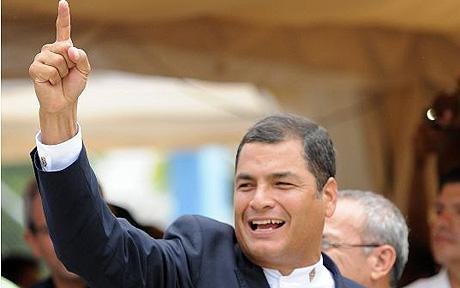Submitted by ICConline on
We're publishing here a translation of an article from our new section in Ecuador.
Since Correa's[1] arrival to power in Ecuador, attacks against the working class have not ceased raining down, but have on the contrary intensified. “Correaism” has shown itself much more efficient than the other governments which preceded it from 1979. From this date the military withdrew behind closed doors and the roles played in the new scenario makes for a more effective management of the crisis of capitalism which broke out at the end of the 1960s. This policy of management was essentially expressed through the flight into generalised debt by all states.
Faced with the impasse facing decadent capitalism, marked by a galloping decomposition which makes the future more and more uncertain even in the eyes of the most optimistic economists, the bourgeoisie has had to resort to further debt and to the application of economic policies of austerity which have had the consequence of plunging the working class into the blackest poverty.
The Ecuadorian state did not escape this tendency and here exports have decreased these three last years. The so-called health of the economy rests on the growth of national revenues in dollars based upon the price of oil which is apparently generating an expansion of revenues to the order of 13%. In reality this is a mirage due to the exhaustion of world reserves and the speculation that this unleashes. But the key to the measures taken to face up to instability is tightening the belts of the workers. Thus the indirect part of wages given over to health and education tends to disappear with the reduction of spending in these sectors, which also provokes job losses in the working class – as with Obama, Sarkozy, Angela Merket, Rajoy or any other government in the world.
Correa protects the interests of the dominant class, imposes the policies of flexibility of employment, of brutal job cuts, freezing of wages, the suppression of collective agreements while avoiding the “trauma” of demonstrations in the streets... thanks to his cajoling speeches axed around the defence of democracy imposed in the name of “popular power”.
Here are some concrete examples of what's been put forward:
- April 30 2008: the imposition of ordinance no. 8, aiming to normalise the “Tercecizacion e diacion Laboral” which means the sacking of 39,200 workers of which only a part will be re-hired by the firms that they worked for beforehand, but as sub-contractors;
- From April 30 2009, “decree 1701” was applied aiming to limit the “privileges” given by collective agreements signed by public workers and the state. Thousands of workers were immediately prematurely retired and others, after having submitted to “evaluations” of their capacities, were forced to quit; in teaching no less than 2957 teachers were “sent down the road”;
- From July 7 2011, “executive decree 813” was applied, which changed the rules of public service and instituted the “buying up of compulsory resignations”[2]. 7093 posts have thus been eliminated since 2011, particularly undermining the health sector which has suffered most job cuts.
Among the working population of Ecuador (which reaches 55.5% of the total population), 57% have no stable job, that's to say they are tossed about between informal work (selling whatever in the street), precarious work and the zone of abject misery deprived of everything...
But even the workers who have a fixed job don't get enough wages to pay for their most basic needs. A “qualified” worker (technical or other professional qualification) gets about $280 per month, a doctor coming out of university after seven years of studies varies between $500 and $700 a month. Those who alone have had salary increases are the police and forces of order. Correa has decreed an increase in the salaries of the military which varies from 5% to 25%. Today a simple soldier coming out of the barracks, trained to kill, will receive a salary of $900 a month.
This is the essence of Correaism, wrapped up in this aberration baptised the “citizens' revolution”, which is part of the ignoble and abominable ideology of the “socialism of the 21st century” so dear to Chavez.
The promises of Correa and of his ideologues of the “socialism of the 21st century” are not valid options for the workers. Their struggle alone can contain a real perspective for the future.
Internacionalismo-Ecuador 5/12
[1]Rafael Correa Delgado was a professor of political economy who worked in Europe and the United States. He came out of the harem of the bourgeoisie and became advisor to the president, then he was Minister of Finance under the Palacio regime. He presented himself as a “humanist and Christian of the left” and made himself noticed through a brief ideological “crusade” against the diktats of the IMF and the World Bank. Carried to the head of a coalition between different left parties, he was elected in the second round of presidential elections, October 2006 and found himself at the head of the Ecuadorian state from March 2007. He reformed the constitution and was re-elected at the first round of presidential elections, that he set off, in April 2009 (NDLR).
[2]“Compra de renuncias obligatorias”, facilitating the job cuts.







 del.icio.us
del.icio.us Digg
Digg Newskicks
Newskicks Ping This!
Ping This! Favorite on Technorati
Favorite on Technorati Blinklist
Blinklist Furl
Furl Mister Wong
Mister Wong Mixx
Mixx Newsvine
Newsvine StumbleUpon
StumbleUpon Viadeo
Viadeo Icerocket
Icerocket Yahoo
Yahoo identi.ca
identi.ca Google+
Google+ Reddit
Reddit SlashDot
SlashDot Twitter
Twitter Box
Box Diigo
Diigo Facebook
Facebook Google
Google LinkedIn
LinkedIn MySpace
MySpace